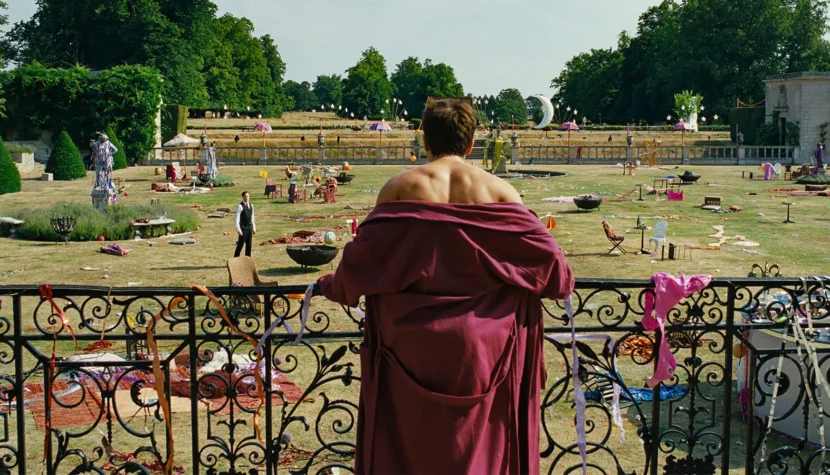SALTBURN. A Sophisticated Game of Pretense [REVIEW]

The new film by Emerald Fennell begins like a lost novel by Scott Fitzgerald: a link between youthful enthusiasm from “This Side of Paradise” and the melancholy of “The Great Gatsby” and “Tender Is the Night.” Oliver Quick (Barry Keoghan) is a shy Oxford student facing social exclusion due to his financial status. His wealthier peers mock his modest appearance, worn-out clothes, overly long sleeves, and borrowed suits. Oliver spends his free time admiring Felix Catton (Jacob Elordi), a local playboy and heir to one of the largest fortunes in Britain. Eventually, the paths of the characters cross, and the fascination, initially one-sided, becomes mutual. As their studies come to an end, Felix invites Oliver to vacation at the titular Saltburn, a grand family estate reminiscent of Jay Gatsby’s.
“Many people get lost in Saltburn,” Duncan (Paul Rhys), the gloomy servant of the Cattons, throws towards the main character. While this statement can be interpreted ambiguously, it literally refers to the absurd size of the estate. Like Nick Carraway, the narrator of Fitzgerald’s most famous novel, Oliver becomes an observer of others’ wealth. The corridors of the multi-story mansion seem endless, matching the length of the hedge maze in the garden. Rubens’ “grotesques” hang on the walls, and precious ceramics from the era are enclosed in glass cabinets. The view from the window reveals a pond, a tennis court, and a swimming pool. Visiting Saltburn once is enough to become addicted to this place like a drug.
Numerous guests residing at the Cattons’ testify to this. In return, the hosts expect only one thing: entertainment. To stay in the loop, one must be constantly vigilant. A slight misstep, a poorly chosen word, a slow descent into routine, and suggestions of eviction will immediately surface. Oliver quickly connects the dots and initiates a complex game with other Saltburn residents. The goal is simple: stay in paradise, close to Felix, for as long as possible. At this point, Fennell puts aside worn-out copies of Fitzgerald’s novels and reaches for something much more predatory: Patricia Highsmith’s “The Talented Mr. Ripley.”

Paul Schrader stated on Facebook that Saltburn clumsily reverses the pattern known from Highsmith’s novels and their film adaptations. A lower-class newcomer does not challenge the establishment here with personal charm – “he is ordinary, and the object of desire [Jacob Elordi’s character] is an embodiment of beauty. It’s an inversion that shouldn’t work. And it doesn’t work.” It seems as if Schrader left the cinema halfway through the movie, precisely at the point when the audience is still convinced of Oliver’s “ordinariness.” Fennell skillfully leads the narrative, confusing the tracks several times. Keoghan’s character is portrayed as a victim for a long time, even though he initially appears a bit strange (played by Hollywood’s new, dedicated psychopath, distinguished by an outstanding performance in “The Killing of a Sacred Deer”). It’s easy to sympathize with him, especially since he is presented in contrast to the jaded world of British aristocrats.
However, Oliver turns out to be a cynical manipulator – a deadly predator who patiently circles his prey. He resembles not only Tom Ripley but also Maciej Musiałowski’s character from “The Hater”: the world is his stage, and life is a constant game. The height of potential winnings depends on the quality of the performance. When the “pity” strategy stops yielding desired results, Oliver begins to exploit the sexual desire of the characters. He preys on their instincts, physiological needs, and then sucks the life out of them like a vampire. And like any vampire, he needs his castle – and the Cattons’ estate clearly caught his eye.

The initially dominant and foregrounded class theme turns out to be a clever smokescreen. Similar to Jacob Elordi’s character, we realize at some point that we’ve been deceived. We were deluded, shamelessly lured into the field – the homoerotic tale of a prince and a pauper transformed before our eyes into a bloody, dark thriller. But is there anything wrong with that? Saltburn is a sophisticated game of appearances, and those looking for social satire on the level of Ruben Östlund have long lost their way in the garden maze. Fennell seems to be weaving a tale of fascination between the poor and the rich and vice versa, but the film spectacularly kills this theme in its most crucial twist. There is no ambition or pretension in Fennell comparable to Östlund’s. Of course, social advancement is at stake in Oliver’s game, but the obsession driving his actions is by no means related to material shortcomings. It’s more a mixture of erotic fascination and an innate need for dominance, heightened by the character’s mental state. Like “The Talented Mr. Ripley” or “A Clockwork Orange” before, Saltburn traps us in a moral dilemma and encourages us to cheer for the sociopath – what can you do when the sight of an unscrupulous parasite consuming the corrupt elite from within is almost cathartic?
Fennell’s second film is not only great, intelligent entertainment but also an audiovisual spectacle, adorned with impressive cinematography by Linus Sandgren (a regular collaborator of Damien Chazelle). Just like in “Promising Young Woman,” Fennell once again lets herself be carried away by pop energy, dusting off hits like Low’s “Flo Rida,” Pet Shop Boys’ “Rent,” or The Killers’ “Mr. Brightside” on the soundtrack. Music is never used purely illustratively – in most cases, song lyrics, to a greater or lesser extent, correspond to the current plot situation (with “Rent” being the best and most explicit example).
François Truffaut once said that the second film is always in contrast to the first – that’s why “Shoot the Piano Player” was so thematically distant from “The 400 Blows.” It seems that Fennell took his advice to heart because, plot-wise, Saltburn doesn’t have much in common with “Promising Young Woman.” However, in terms of direction, it’s undoubtedly a step in the right direction. It’s clear as day that the Brit, who entered the world of cinema as an actress, is becoming more confident behind the camera. She boldly experiments, embraces camp aesthetics, and occasionally treads the fine line of good taste. Saltburn features extreme scenes that put the viewer’s perception to the test. It’s worth facing them, if only to reach the magnificent, played out to the rhythm of “Murder On The Dancefloor” finale.

